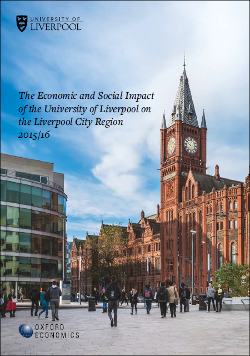Ungated Post | 13 Jun 2017
The Economic and Social Impact of the University of Liverpool on the Liverpool City Region 2015/16

Oxford Economics was commissioned by the University of Liverpool to investigate its economic and social impact on the Liverpool City Region.
Together with its students and their visitors, the University of Liverpool generated a £652 million gross value added contribution to the Liverpool City Region in 2015-16. One in every 57 jobs in the Liverpool City Region (some 10,790 in total) was supported by the University, its students and their visitors in 2015-16. The University is a driver of growth in the City Region; University-supported employment has increased 17 percent since 2011-12.
The report examined the wider impact of the University, on the City Region and beyond. We explore the University’s role as a supplier of graduate talent for the local economy, with 25 percent of 2014-15 graduates working in the Liverpool City Region six months after graduating. The impact of the University’s research is assessed, and the benefit to local businesses of being able to access facilities and experts. The University has a significant social impact; it is committed to widening participation, and many of its staff and students regularly devote time to volunteering.
Oxford Economics’ team is expert at applying advanced economic tools that provide valuable insights into today’s most pressing business, financial, and policy issues.
To find out more about our capabilities, contact:
Americas
Diantha Redd
+1 (646) 503 3052
Email
Asia Pacific
Peter Suomi
+65 6850 0110
Email
EMEA
Aoife Pearson
+44 (0)203 910 8054
Email
Related Services

Post
The economic impact of abandoning the WTO
Oxford Economics have been commissioned by the International Chamber of Commerce (ICC) to provide an independent assessment of the economic impact of WTO dissolution. This report details our findings and the assumptions underpinning our analysis.
Find Out More
Post
The economic impact of the sports activities of public service media
This study shows how the sports activities of public service media supported €4.5 billion of GDP and 57,000 jobs across 31 European countries in 2022. The report also highlights wider economic benefits of public service media sports coverage, such as the way in which it leverages sponsorship income for sports bodies.
Find Out More
Post
Global Trade Education: The role of private philanthropy
Global trade can amplify economic development and poverty alleviation. Capable leaders are required to put in place enabling conditions for trade, but currently these skills are underprovided in developing countries. For philanthropists, investing in trade leadership talent through graduate-level scholarships is an opportunity to make meaningful contributions that can multiply and sustain global economic development.
Find Out More